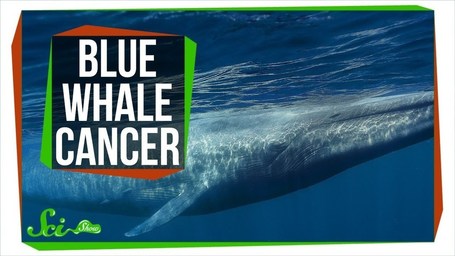(video) Why all blue whales don’t get cancer.
Summary: In December of last year, SciShow produced a video on why whales don’t get cancer. The video shows how researchers have discovered extra cancer-fighting genes in elephants and whales and plan to apply these lessons to fighting cancer in humans. This video is an excellent companion to the recent article here on LongevityFacts titled ‘Secrets of these 200-year-old whales who avoid cancer.’ [With an introduction by Brady Hartman. ]
Introduction by Brady Hartman
By mass, blue whales are the biggest animals on earth. Because of that, they have many more
cells than we do.
Which leads to an interesting paradox: We know that every time a cell copies itself, it could make a mistake that damages its DNA and turn cancerous. Every cell is an opportunity for something to go wrong and trigger the growth of a cancerous tumor. This means that the more cells you have and the longer you live, your chances of developing cancer should be higher. Whales are not only bigger than humans, they also live longer. It is normal for them to live for over a century. Given their long life and an enormous number of cells, you’d think that all whales would have cancer.
However, with whales, that doesn’t hold true.
If scientists could understand why whales seem to escape high rates of cancer, they might be able to solve some of cancer’s mysteries.
Moreover, studies have confirmed that cancer rates across species don’t correlate to body mass or lifespan. This phenomenon is called Peto’s Paradox, named for Richard Peto, who first described the idea in the 1970s. You can learn more about Peto’s Paradox in the linked companion article on whales and cancer.
Their enormous size may be one explanation. Large mammals tend to have slower metabolisms, meaning they burn less energy relative to their size. That’s because large mammals have less surface area relative to their body weight, which cuts down on the calories they lose as heat. There’s less surface area for it to escape. Moreover, with a slower metabolism, the whales are producing fewer free radicals that can damage DNA and trigger the growth of tumors.
Having a slower metabolism, however, is not enough to explain their lower cancer rate. Scientists already know other large mammals fight tumors more directly. For example, elephants and humans share the same set of primary genes with whales. However, the genetic code of elephants has more copies of genes that suppress tumors, called antioncogenes. Elephants have twenty copies of the gene called TP53 that triggers damaged cells to self-destruct. Humans and whales only have one copy. However, they may still be doing something special to keep cancer at bay.
Moreover, some biologists think the elephants might have better versions of antioncogenes than humans or they have special cancer-fighting genes that scientists haven’t discovered yet. It makes sense that large animals like elephants and whales would evolve special cancer-fighting powers. Cancer could be a big problem if it interferes with their ability to stay alive long enough to raise their young.
However, there’s a trade-off. More effective anti-cancer genes also seem to lead to decreased fertility, possibly because the energy used in repairing DNA damage and eliminating tumors has to come from somewhere. For smaller animals that have a lower number of cells, and therefore a decreased risk of cancer, these extra defenses are not worth it. The benefits of producing additional offspring outweigh the risks of developing a tumor before raising them. In those cases, evolutionary pressure may select against more powerful tumor-suppressing genes.
Scientists are digging deeper into these concepts because they’re hoping that whatever helps whales might help us, too. For example, researchers genetically modified mice to overexpress the TP53 gene. In some cases, this genetic tweaking caused bad side effects such as premature aging. However, researchers haven’t given up on finding ways to use this cancer self-destruct button in humans.
Researchers don’t precisely know how the genetic code of the blue whale prevents cancer. However, figuring that out might lead to another tool to help fight this disease in humans.
Related: Learn more about how whales and elephants evade cancer in this article.
Show Us Some Love
- Share this post on social media and help us spread the word– It only takes one click on any of the social media links on this page.
- Follow us on social media – Google+ or Reddit
- Sign up for our email list – We use your email to notify you of new articles. We will not send you spam, and we will not share your email address. You can cancel at any time.
- Tell us what you think – Scroll down to enter your comments below.
References
Cover photo: obtained from the video.
Disclaimer
Diagnosis, Treatment, and Advice: This article is intended for educational and informational purposes only and is not a substitute for qualified, professional medical advice. The information and opinions provided herein should not be used during any medical emergency or for the diagnosis or treatment of any medical condition. Consult a qualified and licensed physician for the diagnosis and treatment of any and all medical conditions. Experimental therapies carry a much higher risk than FDA-approved ones. Call 911, or an equivalent emergency hotline number, for all medical emergencies. As well, consult a licensed, qualified physician before changing your diet, supplement or exercise programs.
Photos, Endorsements, & External Links: This article is not intended to endorse organizations, companies, or their products. Links to external websites, mention or depiction of company names or brands, are intended for illustration only and do not constitute endorsements.

One Reply to “(video) Why all blue whales don’t get cancer.”
Comments are closed.